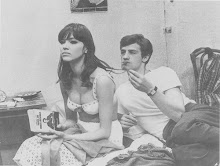
I can breath out now.
I've finally finished One Hundred Years of Solitude & according to The New York Times, I can now call myself a human being. It is, after all, considered by them to be "the first piece of literature since the Book of Genesis that should be required reading for the entire human race."
Where was my head before this? What was I thinking? What was I doing? Was I really so preoccupied for these past nineteen years to have, time after time, overlooked this?
To produce any form of a typical "review" would prove audacious, for there were certainly moments when Marquez would describe a feeling & I would root down through his imagery in attempts to evoke the same emotions in myself. More times than I'd like to admit, I couldn't. Not to sound like Don Henley or anything, but I thought I knew what love was - oh boy, what did I know.
I remember wondering (presumptuously) during Love in the Time of Cholera trailers why they wouldn't instead produce a film version of "One Hundred Years of Solitude." & this is in no way to trivialize Marquez's other works, but upon reading "One Hundred Years of Solitude," I quickly realized that it was far too wonderful, filled with far too many dramas born from magic realism to ever be replicated on screen (or, at least, I deeply hope). *
I believe Stanley Kubrick said it best when referring to his adaptation of Lolita as "such a bloody marvelous book that, no matter what, you're fucked. You are doomed to failure." Any director (I don't care if you're even, well, Kubrick) who attempts "One Hundred Years of Solitude" would be condemned to a similar fate.
For me, Marquez's brilliance arises from the ability to write a novel of most unconventional plots, organically streaming from episode to episode that my heart draws them in like varying hues of light, yet my memory mirrors this in glowing white. The details & repeated names have blurred together to produce the distinct scent that is "One Hundred Years of Solitude" to me: the Colonel's small golden fish, Rebeca crouched at night eating dirt & whitewash, the death of a thousand yellow butterflies, Meme's love.
A novel of fantastical incidents speaks seriously of the greatest truths of our civilization, encompassing an entire nation's history through six generations of the Buendía family. & I couldn't imagine a more honest closing sentence:
"He had already understood that he would never leave that room, for it was foreseen that the city of mirrors (or mirages) would be wiped out by the wind and exiled from the memory of men at the precise moment when Aureliano Babilonia would finish deciphering the parchments, and that everything written on them was unrepeatable since time immemorial and forever more, because races condemned to one hundred years of solitude did not have a second opportunity on earth."
& my favourite passage:
"That night the guard brought down Mauricio Babilonia as he was lifting up the tiles to get into the bathroom where Meme was waiting for him, naked and trembling with love among the scorpions and butterflies as she had done almost every night for the past few months. A bullet lodged in his spinal column reduced him to his bed for the rest of his life. He died of old age in solitude, without a moan, without a protest, without a single moment of betrayal, tormented by memories and by the yellow butterflies who did not give him a moment's peace, and ostracized as a chicken thief."
* Also - far too incestuous

No comments:
Post a Comment